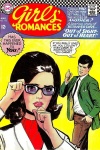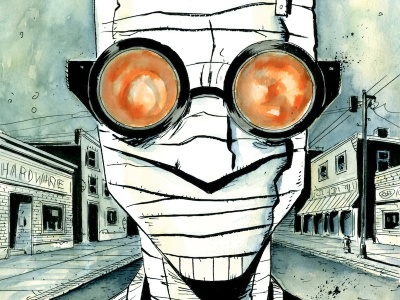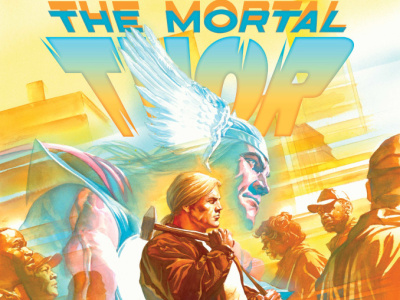 Confessions of a Comic Book Guy is a weekly column by Steve Bennett of Super-Fly Comics and Games in Yellow Springs, Ohio. This week, Bennett looks at the romance novel readers to learn more about a new potential audience for comics.
Confessions of a Comic Book Guy is a weekly column by Steve Bennett of Super-Fly Comics and Games in Yellow Springs, Ohio. This week, Bennett looks at the romance novel readers to learn more about a new potential audience for comics.I must confess I sometimes feel a bit sheepish about the way I keep referencing things I've read in Entertainment Weekly as I so often do here, what with it being so unrelentingly middlebrow and mainstream. But, then again, so am I. And reading it is admittedly a convenient way of seeing how the middlebrow, mainstream culture is dealing with nerd culture. Like, when I went to the EW website the other day I was startled to discover that they considered "'Star Wars' First Look: Alex Ross; cover for Marvel comic book" (see "Alex Ross 'Star Wars' Cover") to be a top story. And if you can find last week's issue, you'll find "Gillian Anderson's Comic Con," a piece promoting her new novel via photos she took during New York Comic Con. As well as a review of the book The Secret History of Wonder Woman by Jill Lepore.
But the article that got my full attention was a report from the 34th annual Romance Writers of America convention which took place the same weekend as New York Comic Con. We know this because EW senior writer Karen Valby went out of her way to mention it in the opening sentence of "A Billion-Dollar Affair." In this multi-page piece on the romance novel industry we're told that romance is "the second-largest book genre, just behind thrillers" and its "sales... ...exceed $1 billion annually. "And that romance publishers were "the first to fully embrace the mass market paperback" as well as "the first to plunge into the great unknown of digital publishing."
The really interesting part came when she wrote, "The history of the romance novel is mired in glib judgment and literary ill-repute. Somehow in our culture men who read comic books are hip, when women, similarly drawn to stories of heroes and fantasies, are written off as pathetic." She also quotes best-selling historical romance writer Sarah MacLean as saying "The challenge of outside perception is the same as with the chick flick; this idea that there's something less valuable about it because it's written by women for women about women." And, finally, as Valby herself puts it, "It's hard to imagine another billion-dollar industry more dismissed by the critical mass."
Excuse me but I can think of another one. When I started reading the article I didn't think I had much, if anything, in common with romance novel readers. But then I found I could completely relate to a quote from Angela James, editorial director for Harlequin's digital-first imprint Carina Press: "Romance readers have always been the one category of reader that has experienced shame when they've gone to the bookstore." The only thing I have an issue with in it is the "one category" part. I believe we've all had to endure that same "glib judgment" in the form of snide looks, snarky remarks and a condescending attitude from others for having the audacity to enjoy what we enjoy.
Valby suggests it was this prevailing sense of shame that lead romance readers to be such early adopters of digital--with an eReader you don’t have to justify or explain what you're reading. That and the space issue; when you read a lot of books (and romance readers do; we’re told on average they read 27 romances a year), they can really pile up. Plus diversity--with digital your choices of reading material expand exponentially beyond the output of the major publishers. All of which sound like reasons why I read digital comics.
Admittedly I don't know much about the romance genre, beyond once having read a Jackie Collins novel on a dare and spending a couple of years shelving used paperback romances at Dark Star Books in Yellow Springs. Which is why I do not doubt the "27 romances a year" statistic. People were constantly bringing us their used romances, not because they wanted to be rid of them as much as they needed room so they could buy more.
Though I've repeatedly written about romance comics I don't know all that much about them either. Especially exactly why Marvel and DC stopped publishing them back in the 70's (other than the obvious one, low sales). Which is why I was so interested in the "Where is the Love? The Strange Disappearance of Romance Comics" panel at Comic-Con (see "Confessions of a Comic Book Guy--The Super Bowl of Marketing"). Michelle Nolan, author of Love on the Rocks: A History of American Romance Comics suggested it was the birth control pill. At the time I accepted it, but only now does the obvious occur to me. If it killed the romance comic why didn't it kill the romance novel? Because the romance comic reader was younger than those reading romance novels and off having romances instead of reading about them?
Naturally I don’t have an answer, but if we ever do figure it out we might find a way to get this ready-made audience reading comics.
The opinions expressed in this column are solely those of the writer, and do not necessarily reflect the views of the editorial staff of ICv2.com.







